|
 Secure Site
Secure Site
|
 |
Archive for the 'sleep' Category
 tips for staying healthy this holiday season As the chill of winter arrives, so does the prospect of congestion and coughing, sore throats and sniffles, and other less-than-desirable symptoms.
But you might have noticed that colds, flus, and other seasonal blights seem to hit some people again and again, while others coast through to spring unscathed. Is this punishment random, like a tornado, or is there a method to the cold-and-flu madness?
There is indeed a method. While we can all help prevent viral and bacterial infections by washing hands regularly and avoiding germ-laden surfaces, it’s not just the bugs we encounter that determine how healthy we are. Our well-being also depends on how prepared our bodies are to fight them.
An entire field of research called psychoneuroimmunology has bloomed in recent years. It aims to uncover the links between the brain, behavior, and the immune system. One of its primary targets is the universal phenomenon known as stress.
We’ve all experienced the nasty cold that comes after a deadline, and scientific evidence has borne out this pattern, with clinical studies showing that psychological stress can weaken defenses and slow recovery from illnesses small and large. A recent study from the University of California, Los Angeles, in fact, found that the effects of stress play out at the cellular level: Hormones cued by emotional stress make immune cells age faster.
What is stress? “It’s our body’s response to something that taxes or exceeds our resources, whether from external pressures or our own internal worries,” says Frances Cohen, a psychologist at the University of California, San Francisco. What feels stressful depends on a person’s reaction to a given circumstance. “For some people, getting divorced is a positive step,” she says. “But for others, it’s devastating.” When we perceive something as harmful, our brain triggers hormones such as cortisol, which can affect the immune system. “You can trace it from the brain through the body,” Cohen says.
After stress hormones pour into the bloodstream, “the body tries to correct itself, to bring itself back into homeostasis,” she adds. So if the stress is brief, the hormones dissipate, and the body returns to normal. In one study, her group found that people who lost their jobs had lower levels of an important class of immune cell. However, she says, “we saw a recovery of immune levels, a bouncing back, in people who got a new job.”
 reduce stress Stress that lasts over a long period of time proves far more damaging to our bodies than short-term stress. A study published earlier this year, for instance, found that consistently high levels of perceived stress could reduce women’s ability to fight an infection from human papilloma virus (HPV), which can cause cervical cancer; no such effect occurred with one-time stressful events such as job loss.
And in a preliminary study published in August, researchers studied people caring for family members with chronic illnesses (a long-term stressor); compared with a control group, the caregivers’ white blood cells were less responsive to cortisol and more responsive to a pro-inflammatory compound — leaving their bodies in a state of chronic inflammation.
Exercise and Sleep
Immunity isn’t all in your head, of course; day-to-day physical habits matter a great deal. Exercise, sleep, and nutrition in particular have strong links to immunity — and, not coincidentally, to our mental well-being.
Start with fitness: Those who exercise regularly, says Monika Fleshner, Ph.D., a professor of integrative physiology at the University of Colorado at Boulder, acquire a resiliency that makes them less susceptible to health problems. “This is especially important when we’re stressed and as we age,” says Fleshner.
Interestingly, more exercise isn’t necessarily better. “While too little exercise is bad for the immune system, too much is just as bad,” she notes. Athletes who exercise strenuously may have higher rates of respiratory infections. Just the right amount of movement helps maintain a healthy weight, which in turn plays a role in how well we battle colds and flus: People who are obese have diminished immune responses and more severe infections.
The fact that many Americans don’t get enough sleep and rest spells bad news for our immune systems, too, says Motivala, increasing the risk of conditions ranging from frequent colds to diabetes. “A normal sleep cycle is vitally important for immune function,” he explains, since immune cells circulate throughout the body according to cycles of sleep and wakefulness. Their levels in the blood peak around midnight, then gradually return to lymph nodes as we sleep. A lack of sleep interrupts this process, lowering levels of “natural killer” cells, important first-line defenders against infections.
 prioritize shut-eye
Prioritize Shut-Eye
Evidence shows that sleep has wide-ranging effects on immunity. Most of us need about eight hours a night, but quality matters just as much. “Keep track of how you feel in the morning,” says Sarosh Motivala. A little grogginess is fine, but you shouldn’t be dragging. “If you’re waking up tired, it doesn’t matter if you had eight hours or five hours, something is not right,” he says. Sleep problems can arise from a number of sources, including stress, a poor diet, or a sedentary lifestyle, so talk to your doctor or alternative health therapist to identify the cause in each case. Be sure to treat yourself gently in the morning by waking progressively over a 10 minutes period of time with The Zen Alarm Clock with Chime.
One of the ultimate Zen like experiences is waking-up from a great slumber refreshed and energized. Your mind and body are harmoniously one, both alert and focused. Having a refreshed mind and body are two keys to a natural and Zen lifestyle. Waking up in the morning should not be a loud and abrupt awakening, but rather it should be a peaceful positive experience. The right natural alarm clock can transition your deep and tranquil sleep into a serene start to consciousness. Imagine a long-resonating Tibetan bell-like chime waking you up to a beautiful morning experience.
The right alarm clock can be the most beneficial investment for you. With our Now & Zen natural alarm clock you are awakened more gradually and thus more naturally. Now & Zen is focused on creating a naturalistic lifestyle, and our clocks are an example of our philosophy.
adapted from Body + Soul, November 2008
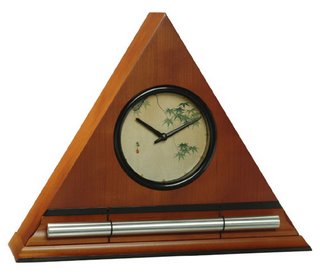 chime alarm clocks and natural sounding timers for a gentle wake up
Now & Zen – The Soothing Chime Alarm Clock Store
1638 Pearl Street
Boulder, CO 80302
(800) 779-6383
Posted in sleep, Sleep Habits, Well-being
Research published in the last two years shows that certain slow activities–like gentle yoga or gardening–can reduce your stress level and blood pressure and improve your body’s ability to regulate sugar. Past studies have shown that other habits like meditation can help reduce chronic pain and enhance mental clarity. The first step to finding “slowness”is to clear some room in your life–watch less TV or spend less time browsing at the mall. “Jettison the clutter that clogs up your schedule,” says Carl Honoré, author of In Praise of Slowness (HarperOne, 2004). “When you focus on the things that are important at work or at home you can enjoy those things more,”he says. You can also take a more relaxed approach to the things you already do and adopt new habits that require mindfulness. “It’s one thing to say you’re going to slow down, but a slow hobby helps you put those words into practice,” says Honoré. To get you started we’ve come up with seven ways to destress and reenergize.
 gardening is a great mindfulness practice that cultivates stillness of mind 1. Become a Gardener
Caring for flowering plants may help you relax and get grounded. In 2004, researchers at Japan’s Utsunomiya University found repotting plants lowered fatigue and promoted physiological relaxation in study participants, and that working with flowers seemed to have a stronger positive effect than working with nonflowering plants.
HEALTH BENEFITS Research shows that exposure to plants–and even just looking at them–can reduce blood pressure, increase concentration and productivity, and help you recover from illness, says Andy Kaufman, Ph.D., assistant professor of tropical plant and soil sciences at the University of Hawaii in Honolulu. He cites a classic 1984 study, published in Science, which showed that even the view of a green garden helped surgical patients recovering from gall bladder surgery. Among a group of 46 patients in a Pennsylvania hospital, the 23 who had rooms with windows facing greenery had shorter postoperative stays and needed fewer pain–relieving analgesics than the 23 whose windows faced a brick wall.
GETTING STARTED If you live in an apartment or don’t have much room to garden, invest in the EarthBox (earthbox.com), a self–watering container garden that comes with potting soil and fertilizer. “Even if you have a brown thumb, you can grow things [in it],”says David Ellis, American Horticulture Society spokesperson. You could also join a community garden; visit ahs.org, the American Horticulture Society’s website, for more info.
 yoga helps to slow us down 2. Practice Slow Yoga
Slow yoga emphasizes one drawn–out breath for each movement you make. Like tai chi, it uses many repetitive flowing moves. “When you practice slow yoga, you create more awareness between mind and body,”says Beth Shaw, founder of Yoga Fit Training Systems in Los Angeles. This creates a deep sense of stillness and helps develop patience and lower stress, she adds.
HEALTH BENEFITS Last year, researchers in Sweden and India showed that practicing yoga can reverse the negative effects of high blood pressure, obesity, and high blood sugar. The studies, published in the journal Diabetes Research and Clinical Practice, showed reduced waist circumference, blood pressure, blood sugar, and triglycerides (the chemical form of fat cells) and higher HDL (so–called good cholesterol) levels in a control group that practiced yoga versus a placebo group.
GETTING STARTED To find a Slow Yoga class near you visit yogafit.com or inquire at your local yoga studio. You might also consider restorative or yin yoga, two other gentle forms of the practice.
 Take a nap 3. Take a Nap
You snooze, you win, according to a Harvard study published last year in The Archives of Internal Medicine. Researchers revealed that people who regularly napped at least three times a week for an average of 30 minutes had a 37 percent lower risk of heart attack than those who didn’t nap. “It shows that napping is an important preventive strategy just like regular exercise, eating right, and not smoking,”says Sara C. Mednick, Ph.D., author of Take a Nap! Change Your Life (Workman, 2006).
HEALTH BENEFITS A daily nap also boosts serotonin, says Mednick, which may lead to improved memory and performance. Napping can even contribute to weight loss, according to a study in the American Journal of Physiology, Endocrinology, and Metabolism in 2007. That study looked at hormone levels in 41 men and women who were part of a seven–day sleep–deprivation experiment. Those allowed to nap for two hours following a night without any sleep showed a significant drop in cortisol, a hormone related to high levels of stress, and a complement of growth hormone, which helps regulate insulin and fat storage. Researchers concluded that a midafternoon nap improves alertness and performance and reverses the negative metabolic effects of sleep loss.
GETTING STARTED The best time to nap is between 1 p.m. and 3 p.m., but a 15– to 20–minute power nap at any time can help. Set your Zen Alarm Clock for 20 minutes. Close the office door and take a snooze, or find a quiet place where you feel safe. Nap on weekends, Mednick says. “Just don’t use the weekend to catch up on sleep lost in the week.”Check with your doctor about napping if you’re being treated for insomnia.
4. Start a Slow Hobby
 learning to paint Hobbies that require mindful, solitary activity–such as knitting, painting, sculpting, crocheting, or quilting–can act as a brake on your hectic pace.
HEALTH BENEFITS “Slow hobbies help you cultivate the lost art of concentration and being in the moment. They have a meditative quality to them,”says author Carl Honorè. “And that calming effect goes beyond the act itself. Maintaining that inner stillness enables you to negotiate the fast–moving waters of the rest of your day.”
GETTING STARTED Sixty–four percent of people who knit or crochet say they use these crafts to help them reduce stress and relax, according to the Craft Yarn Council of America. Visit craftyarncouncil.com for information. To learn about drawing, visit drawspace.com. Check with a local college or community center for other craft classes.
5. Eat Slowly
Eating too fast creates stress in the body, says nutritionist Marc David, author of The Slow Down Diet (Healing Arts Press, 2005). That causes a spike in cortisol and insulin, which in turn diminishes your ability to burn calories and makes you more likely to gain weight. Eating quickly also leads to overeating. “The brain demands more food if it doesn’t have time to register its needs for taste, aroma, and satisfaction,”says David.
HEALTH BENEFITS Taking time to eat creates a relaxation response, which means you’ll have fewer digestive complaints and your body will be able to take in the nutrients it needs. Plus “we make better food choices, and we know when to stop,”he adds.
GETTING STARTED To ease the pace, double the time you spend on your meals; for example, if you usually eat breakfast in five minutes, stretch it out to ten. “Focus on your food: Taste it, enjoy it, notice it, savor it,”says David. “Find relaxed time between bites by slowing down your internal conversation. Let go of any sense of urgency, and allow the moment to be sensual.”The cooking process can help you slow down too, says David. “Instead of microwaving something, make a soup from scratch.”
6. Do One Thing at a Time
A lot of us believe we get more done by multitasking. But research at the University of Michigan published in the Journal of Experimental Psychology in 2001, shows the opposite is true. “If you concentrate on one task at a time, you get more done faster and make fewer mistakes,” says David E. Meyer, director of the Brain, Cognition, and Action Laboratory at the University of Michigan.
HEALTH BENEFITS Taking on chores one at a time reduces chronic stress and protects your short–term memory, which comes under fire if the brain is overtaxed.
GETTING STARTED To curb outside distractions and focus better, set aside time when you can concentrate on one activity from start to finish. For example, check e–mail once an hour and turn off your instant messaging; let your phone messages go to voice mail and only check them occasionally throughout the day.
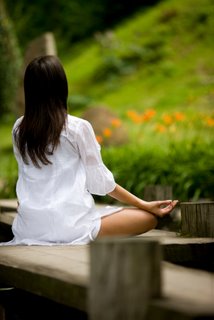 practice meditation in order to slow down 7. Meditate
“Meditation teaches us to focus,”says Steven Hartman, director of professional training at the Kripalu Health and Yoga Center (kripalu.org) in Stockbridge, Mass. “All day your mind is chattering. When you meditate, you can hear your own inner wisdom.”
HEALTH BENEFITS Studies have shown that practicing meditation also improves blood pressure, fortifies the immune system, and promotes a sense of well–being. “A daily meditation practice can bring body, breath, mind, and spirit into balance,”says Hartman.
GETTING STARTED Check out a program like Transcendental Meditation. (See tm.org.) Or begin at home: “Put an egg timer on and stay with your breath for just two and a half minutes,”says Hartman. “Keep your spine tall and straight and allow the breath to be natural.”If you’re seated on the floor, a cushion can raise your pelvis and bring your spine into a natural position. As you get comfortable with the practice, you can increase your time to 15 or 30 minutes a day.
adapted from Natural Health Magazine, by Chrystle Fiedler
One of the ultimate Zen like experiences is waking-up from a great slumber refreshed and energized. Your mind and body are harmoniously one, both alert and focused. Having a refreshed mind and body are two keys to a natural and Zen lifestyle. Waking up in the morning should not be a loud and abrupt awakening, but rather it should be a peaceful positive experience. The right natural alarm clock can transition your deep and tranquil sleep into a serene start to consciousness. Imagine a long-resonating Tibetan bell-like chime waking you up to a beautiful morning experience.
The right alarm clock can be the most beneficial investment for you. With our Now & Zen natural alarm clock you are awakened more gradually and thus more naturally. Now & Zen is focused on creating a naturalistic lifestyle, and our clocks are an example of our philosophy.
 Zen Meditation Timers with Soothing Chime Now & Zen – Soothing Chime Alarm Clock & Timer Store
1638 Pearl Street
Boulder, CO 80302
(800) 779-6383
Posted in Chime Alarm Clocks, intention, Meditation Timers, Meditation Tools, mindfulness practice, Natural Awakening, Now & Zen Alarm Clocks, sleep, Sleep Habits, wake up alarm clock, Well-being, yoga, Yoga Timer, Yoga Timers by Now & Zen, Zen Alarm Clock, Zen Timers
 winter hibernation In the depths of winter, do you find yourself wanting to sleep more, eat more and curl up by the fire? We often behave as if seasonal changes are irrelevant to a modern lifestyle. After all, in many ways, civilization is all about overcoming nature. But our bodies are evolutionarily old and remember how weather once dictated behavior. In winter, we hunkered around a fire, repairing tools and telling tales that wove our culture. We packed our bodies close and slept long.
Now we act as if it’s always summer, demanding consistently high productivity at work and at home. But our bodies require cycles of activity and rest—daily, annually. When days are long, our metabolisms and energy levels amp up. In winter, we produce hormones that make us sleepy, giving us time to restore body, mind and soul.
And there’s nothing wrong with that cycle—except that we work against it, forcing ourselves to operate at summer levels even in winter. No wonder so many people feel depressed at this time of year!
How SAD is that?
You’ve probably heard of Seasonal Affective Disorder, or SAD. You might even suffer from it—as many as half a million U.S. citizens do, according to the American Academy of Family Physicians. The fact that most clinicians address the issue via technology (daily exposure to high-intensity electric light) and/or medication provides an interesting perspective on our time. But some have noted that SAD’s symptoms have more in common with hibernation than with clinical depression.
Could SAD be a result of modern living’s demand to move at top speed all day, every day—and mostly indoors, disconnected from the sun’s cycles? Could we give in to a bit of hibernation?
 Time for Winter's Nap
Oh, to hibernate!
Hibernation is a survival strategy some animals use to get through foodless winters. Though humans don’t hibernate, some cultures have come close.
In 1900, the British Medical Association published a description of winters among Russian peasants. For centuries, they survived scant winter food by engaging in lotska—sleeping the whole season away. “At the first fall of snow the whole family gathers round the stove, lies down, ceases to wrestle with the problems of human existence and quietly goes to sleep.”
The peasants woke daily to eat some bread and drink some water and then dropped off again, taking turns keeping the fire going. After six months, “the family wakes up, shakes itself, goes out to see if the grass is growing, and by-and-by sets to work at summer tasks,” the article states.
In a 2007 New York Times editorial, historian Graham Robb similarly described rural 19th-century France:
Economists and bureaucrats who ventured out into the countryside after the Revolution were horrified to find that the work force disappeared between fall and spring…Villages and even small towns were silent, with barely a column of smoke to reveal a human presence. As soon as the weather turned cold, people all over France shut themselves away and practiced the forgotten art of doing nothing at all for months on end.
 slowing down
Dreaming of a better world
What if we indulged our inclination to slow down in winter? We’d sleep more and demand less from ourselves. We’d be more inward and reflective. I once met an artist who had mastered this. Perusing her work, I asked how she stayed creative as a painter, writer, weaver and sculptor. Her answer:
She changes media each season. In summer she’s out on her deck chiseling a sculpture. In fall, she is reflective and poetic. In winter, she works with warm fiber at her loom. And as spring beckons her outdoors, she sets up her easel in the meadow. Should our lives be any less a work of seasonal art?
One of the ultimate Zen like experiences is waking-up from a great slumber refreshed and energized. Your mind and body are harmoniously one, both alert and focused. Having a refreshed mind and body are two keys to a natural and Zen lifestyle. Waking up in the morning should not be a loud and abrupt awakening, but rather it should be a peaceful positive experience. The right natural alarm clock can transition your deep and tranquil sleep into a serene start to consciousness. Imagine a long-resonating Tibetan bell-like chime waking you up to a beautiful morning experience.
The right alarm clock can be the most beneficial investment for you. With our Now & Zen natural alarm clock you are awakened more gradually and thus more naturally. Now & Zen is focused on creating a naturalistic lifestyle, and our clocks are an example of our philosophy.
Adapted from Natural Home Magazine, January/February 2009 by Carol Veniola
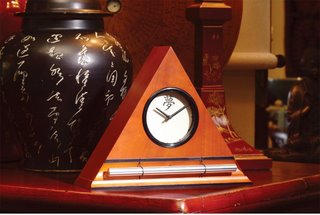 Zen Alarm Clock Now & Zen – Natural Chime Alarm Clock Store
1638 Pearl Street
Boulder, CO 80302
(800) 779-6383
Posted in Japanese Inspired Zen Clocks, Natural Awakening, Now & Zen Alarm Clocks, sleep, Sleep Habits, wake up alarm clock, Well-being
 progressive chime clock can help reduce stress and help avoid lack of sleep Although the occasional all-nighter is OK, people who regularly skimp on z’s can’t undo sleep deprivation’s detrimental effects by simply sleeping later on on weekends, says a new study in the journal Science of Translation Medicine. Contrary to popular belief, the energy you feel after a Saturday morning sleep session is only short lived, according to the study. Chronic sleep loss has a cumulative effect on performance. Why? Lack of sleep raises levels of the stress hormone cortisol and affects a person’s ability to respond to stimuli, says Catherine Darley, ND, founder of Seattle’s Institute of Naturopathic Sleep Medicine. Sleep also plays a key role in mood regulation and overall physical and mental functioning. If you need some extra help falling asleep, try a natural insomnia supplement made with melatonin, tryptophan, or valerian. Inquire at your local health food store.
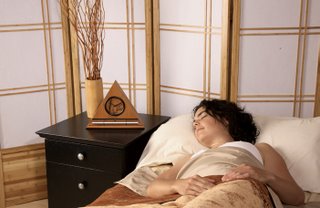 Progression Alarm Clocks for a Gradual Awakening When you have found the perfect routine for falling asleep remember to wake yourself gently so that you can start the day with grace. Set your Zen Alarm Clock 10 minutes earlier than you need to get up so that you can slowly awken in the morning. The Zen Alarm Clock’s long-resonating Tibetan bell-like chime makes waking up a beautiful experience — its progressive chimes begin your day with grace. When the Clock’s alarm is triggered, the acoustic chime bar is struck just once … 3-1/2 minutes later it strikes again … chime strikes become more frequent over 10 minutes … eventually striking every 5 seconds until shut off (see the chime progression graph, below). As they become more frequent, the gentle chimes will always wake you up — your body really doesn’t need to be awakened harshly, with a Zen Clock you’re awakened more gradually and thus more naturally.
adapted from Natural Solutions Magazine, May 2004 by Leslie Crawford
 Chime Alarm Clock - Progressive Wake-Up Clock with Natural Acoustic Chime Now & Zen – Progressive Alarm Clock Shop
1638 Pearl Street
Boulder, CO 80302
(800) 779-6383
Posted in Bamboo Chime Clocks, Chime Alarm Clocks, Japanese Inspired Zen Clocks, sleep, Sleep Habits
 Five tips to fall asleep faster Having trouble falling asleep? Try these tried and true methods to help you fall asleep faster.
Take a walk. In Chinese medicine, insomnia caused by your brain’s inability to shut off the day’s stress is called “disturbed shen qi,” or a disturbed mental spirit. Releasing daytime stress before bedtime by taking a brisk walk or a warm bath is often more effective than taking a sedative.
Turn down the heat. Most people sleep more soundly in a cool room. A 2004 University of South Australia study found that the body needs to drop its core temperature for sleep to initiate normally.
Pump up the serotonin. Serotonin is a natural hormone associated with inducing sleep. Deficiencies in tryptophan, vitamin B6, niacin, magnesium or other nutrients can inhibit the hormone’s functioning. The best way to maintain proper nutrient levels is to eat a balanced diet. A daily multivitamin may help supplement dietary gaps. If you suspect a severe serotonin deficiency, consult your medical health professional.
Take charge with the 20-minute rule: If you lie sleepless for more than 20 minutes, get up and do a task. Get your mind out of the circular problem of being kept awake by the inability to fall asleep. Read, iron that pile of clothes or write in your journal.
Balance your blood sugar: If you’re not sleeping well, ask your doctor about testing your blood sugar levels. People suffering from hypoglycemia can experience blood sugar fluctuations at night. A drop in blood sugar signals the body to produce hormones and neurotransmitters that stimulate sugar release, which may wake you up. If you are hypoglycemic, ask your health care provider whether nutritional measures are appropriate for you.
One of the ultimate Zen like experiences is waking-up from a great slumber refreshed and energized. Your mind and body are harmoniously one, both alert and focused. Having a refreshed mind and body are two keys to a natural and Zen lifestyle. Waking up in the morning should not be a loud and abrupt awakening, but rather it should be a peaceful positive experience. The right natural alarm clock can transition your deep and tranquil sleep into a serene start to consciousness. Imagine a long-resonating Tibetan bell-like chime waking you up to a beautiful morning experience.
The right alarm clock can be the most beneficial investment for you. With our Now & Zen natural alarm clock you are awakened more gradually and thus more naturally. Now & Zen is focused on creating a naturalistic lifestyle, and our clocks are an example of our philosophy.
adapted from Natural Home, November/December 2010
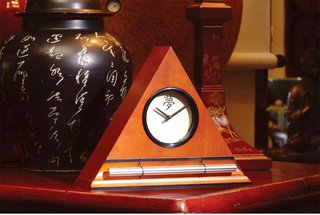 Gentle Wake Up Alarm Clocks with Chimes Now & Zen – The Natural Chime Alarm Clock Store
1638 Pearl Street
Boulder, CO 80302
(800) 779-6383
Posted in Insomnia, Natural Awakening, Now & Zen Alarm Clocks, sleep, Sleep Habits, wake up alarm clock, Well-being
 How to have more energy in the morning It’s often hard to find the inspiration to get out of your nice, comfortable bed when you’re still so tired. But according to Kundalini yoga, a built-in supply of energy lies dormant at the root of the spine, like a bulb that rests underground, waiting for a cue to bloom. By accessing this vitality, you’ll have the charge you need to fire up your day — without having to resort to a double latte.
“When you awaken your Kundalini energy and get it flowing up your spine,” says Maya Fiennes, a London yoga teacher and star of the DVD “Kundalini Yoga to Detox and Destress,” “you become alert and uplifted instead of sluggish and stressed.” We worked with Fiennes to develop this series of simple moves that stretch and strengthen the spine, increase vitality, reduce tension, release impurities, and improve focus — everything you need to face what lies ahead.
Camel Ride (pictured)
Targets
The lower spine.
What It Does
Releases lower-back tension, opens the hips, stimulates the digestive and immune systems, and promotes mental focus. “When you flex the spine,” says Fiennes, “you flex the mind.”
How to Do It
Sit cross-legged on the floor with your hands resting on your ankles. Bring your ribs and chest forward, gently arching your back, as you inhale. Then move the rib cage backward and round your lower spine as you exhale. Keep your neck relaxed and your chin parallel to the ground. Continue doing this exercise in unison with your breath for about two minutes, set your zen timer to repeat every 2 minutes and repeat six times.
Sufi’s Circle
Targets
The middle spine.
What It Does
Creates more space in the torso and encourages the lungs to expand; further stimulates digestion; soothes the nervous system. “The spiral is a familiar pattern in nature,” says Fiennes. “It’s very calming to move this way.”
How to Do It
Inhale and rotate your ribs forward and to the right, then exhale as you continue back and to the left, drawing a big circle with your chin and rib cage. Your spine will arch slightly and then round throughout the exercise. Rest your hands on your knees, using them for leverage. After two minutes, reverse and repeat for two more minutes.
Spinal Twist
Targets
The upper spine.
What It Does
Promotes detoxification; stimulates the lymphatic system; encourages energy to flow throughout the spine.
How to Do It
Sit with your hands on your shoulders, elbows parallel to the ground, and shoulders relaxed. As you inhale, twist your torso, shoulders, and head to the right. Exhale and twist to the left. Alternate between the right and left sides, gradually increasing your pace. After a minute, make the “okay” symbol with your fingers and begin to slowly straighten your arms with each twist until they are straight above your head. To finish, bring your hands into a prayer position and feel the energy coursing along your spine.
One of the ultimate Zen like experiences is waking-up from a great slumber refreshed and energized. Your mind and body are harmoniously one, both alert and focused. Having a refreshed mind and body are two keys to a natural and Zen lifestyle. Waking up in the morning should not be a loud and abrupt awakening, but rather it should be a peaceful positive experience. The right natural alarm clock can transition your deep and tranquil sleep into a serene start to consciousness. Imagine a long-resonating Tibetan bell-like chime waking you up to a beautiful morning experience.
The right alarm clock can be the most beneficial investment for you. With our Now & Zen natural alarm clock you are awakened more gradually and thus more naturally. Now & Zen is focused on creating a naturalistic lifestyle, and our clocks are an example of our philosophy.
adapted from Body + Soul, March 2008 by Kate Hanley
 Solid maple and walnut clocks use chimes to emulate Tibetan bells to wake you
Now & Zen’s Natural Alarm Clock Store
1638 Pearl Street
Boulder, CO 80302
(800) 779-6383
Posted in intention, mindfulness practice, Natural Awakening, sleep, wake up alarm clock, Well-being, yoga, Zen Alarm Clock
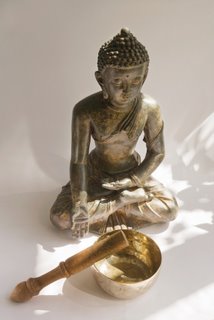 Carved Wooden Thai Buddha with Singing Bowl Music can move us to tears, help us feel calm or comforted, or inspire us to action. The rhythmic sounds of nature (think of waves breaking on a beach) can bring us into balance. Now researchers are learning more about how music and sound directly affect the healing process.
EVIDENCE. A 2008 study at the University of Maryland School of Medicine revealed that listening to music you consider joyful for 30 minutes helps release endorphins to relieve pain and reduce stress, which can otherwise overload your immune system and lead to a host of health conditions. Another study completed last year at Seattle University in Washington showed that listening to Mozart for 12 minutes three times a week can lower systolic blood pressure by seven points.
YOUR BODY TUNES IN. Researchers say that when you listen to music and sounds, your heartbeat, breath, and brain waves begin to slow down or speed up in response to what you’re hearing. Your body syncs up with the sound, and the result can be an enhanced relaxation response—stress lifts, your heartbeat slows, muscles relax, and your body releases feel-good endorphins—or improved energy levels, depending on the rhythm.
GET STARTED. Try these ways to benefit from sound therapy:
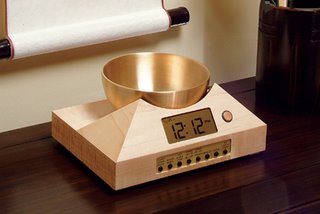 Zen Timepiece, a brass singing bowl alarm clock clock and timer for sound healing EASE STRESS:
Use tuning forks and singing bowls or The Zen Timepiece with Gong
“Sonic tools” like tuning forks and singing bowls can soothe an overexcited nervous system, says Jonathan Goldman, author of The Seven Secrets of Sound Healing (Hay House, 2008). Singing bowls create a calming noise when you run a mallet around the rim, and tuning forks hum when tapped.
Try it: Use these tools as frequently as needed, says Goldman. For tuning forks, go to Healing Sounds or Biosonics. For crystal singing bowls, visit Crystal Tones. For Tibetan singing bowls, try Now & Zen, Inc. in Boulder, CO. Get the Zen Timepiece with Brass Singing Bowl for use as an ideal Alarm Clock to wake you gentlly and progressively in the morning.
RELIEVE INSOMNIA:
“Music is to the nervous system what nutrients are to the body,” says Joshua Leeds, author of The Power of Sound (Healing Arts Press, 2001). He designs audio CDs with music, special effects, and sounds from the natural world to enhance various activities, such as falling asleep.
Try it: See Sound Remedies or Steven Halpern Inner Peace Music.
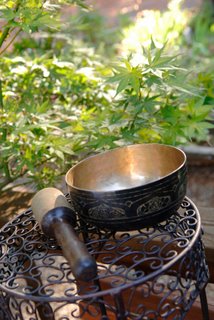 Tibetan Singing Bowls are used as acoustic instruments in Zen Alarm Clocks Listen to a healing CD
Try it: Set your acoustic Zen Alarm Clock before falling asleep so that you can wake up to the gentle chime in the morning.
SHARPEN YOUR MIND:
Learn an instrument
Studies show that daily practice of a musical instrument can keep the brain young and pliable. It can also help relieve tension as your body actually resonates with the soft energies of the instrument.
Try it: Find a local teacher and ask about beginner lessons. Practicing for five minutes can clear tension and a foggy mind.
adapted from Natural Solutions Magazine
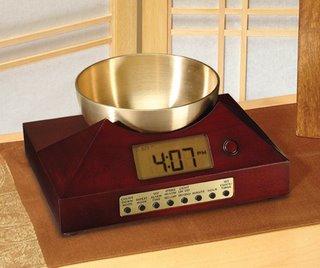 Tibetan Bowl Alarm Clock for a Gentle Awakening in the Morning
Now & Zen’s Singing Bowl
Alarm Clock Store
1638 Pearl Street
Boulder, CO 80302
(800) 779-6383
Posted in sleep, wake up alarm clock
 The Perfect Sleep Routine Includes Setting your Zen Alarm Clock Anxiety is one of the main causes of insomnia and sleep disruption: When you think about something stressful while lying in bed, it’s harder for your body to relax and drift off to dreamland — and this nightly pattern only gets worse as your brain and body learn to dread bedtime.
You may also be deliberately robbing yourself of much-needed rest by staying up too late or rising too early: Most of us need seven to nine hours of sleep a night, but many overscheduled and overworked adults regularly get by on less. Skimping on sleep can cause fatigue and attention problems, and increase your risk of disease.
Tips for Avoiding Lack of Sleep
Morning/Afternoon
At lunchtime, choose wisely: An animal study published in the journal Cell Metabolism in November 2007 linked a high-fat diet with a disrupted circadian clock. At least three hours before bed, get some exercise that raises your heart rate. “Aerobic exercise in the late afternoon — even just walking home from work — can help you burn off the stress of the day and raise your body temperature,” Walsleben explains. “This has the potential to deepen your sleep later on.” Also, avoid taking siestas during the day to help maintain your sleep drive.
Evening
Eat dinner several hours before bed to give your body time to digest, and avoid spicy or heavy foods if you’re prone to heartburn. If you drink wine or beer, do so “three or four hours away from bedtime,” advises Walsleben; while alcohol may speed the onset of sleep, it can disrupt the sleep cycle later.
Night
Avoid watching intense TV shows, paying bills, or engaging in other stimulating activities an hour or two before bedtime. Instead, dim the lights to stimulate the release of melatonin and do a few relaxing yoga poses (such as Legs Up the Wall and Child’s Pose) or 10 minutes of deep breathing or meditation. Be sure to set your Zen Alarm Clock for your meditation practice. If you have a bathtub, use it. ( Adding relaxing lavender oil will help.)
 tips for a perfect sleep routine Wake up gently with your Zen Alarm Clock with chime at the same time every day, whether that’s 5:30 or 8:30. This ritual will help maintain your circadian rhythms and make it more likely you’ll fall asleep at the same time every night, too. (Yes, you can sleep an hour later on weekends, just remember to change your alarm clock on Monday!) As soon as you wake up, “get into some sort of daylight situation really quickly, even if it’s just stepping out on a balcony,” suggests sleep expert Joyce Walsleben, R.N., Ph.D. Bright light suppresses the production of melatonin, a sleep-inducing hormone in your brain, and helps set your body clock. If you’re going to have coffee, this is the time. Walsleben recommends that women avoid it from noon on, and limit their morning dose to a cup or two. And keep in mind that “if you drink an 8-ounce cup in the morning,” cautions Rubin Naiman, Ph.D., “you may still have small amounts of caffeine left in your blood at bedtime.”
By using your Zen Alarm Clock, you will wake up gradually allowing your body to ease into your day. Your body will thank you.
One of the ultimate Zen like experiences is waking-up from a great slumber refreshed and energized. Your mind and body are harmoniously one, both alert and focused. Having a refreshed mind and body are two keys to a natural and Zen lifestyle. Waking up in the morning should not be a loud and abrupt awakening, but rather it should be a peaceful positive experience. The right natural alarm clock can transition your deep and tranquil sleep into a serene start to consciousness. Imagine a long-resonating Tibetan bell-like chime waking you up to a beautiful morning experience.
The right alarm clock can be the most beneficial investment for you. With our Now & Zen natural alarm clock you are awakened more gradually and thus more naturally. Now & Zen is focused on creating a naturalistic lifestyle, and our clocks are an example of our philosophy.
Now & Zen Alarm Clocks has adapted this from Body + Soul Magazine
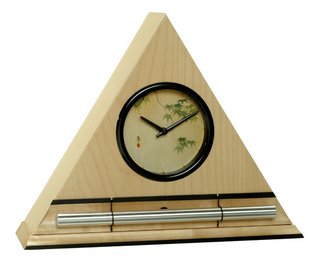 Set Your Zen Wake-up Alarm Clock as Part of Your Perfect Sleep Routine Now & Zen – The Zen Alarm Clock Store
1638 Pearl Street
Boulder, CO 80302
(800) 779-6383
Posted in Chime Alarm Clocks, Natural Awakening, sleep, Sleep Habits
 sleep tips Tools for Better Sleep
Guests at the Ritz-Carlton, Kapalua can experience a new program called “Sleep Fit”. Developed by Claudia Micco, mind-body-fitness director, its aim is to provide guests with a better understanding of themselves. “We’re offering them the tools,” says Micco. “If they want to continue the work at home, they’ll have the tools. They can look at what personal obstacles they need to overcome to improve the quality of sleep and therefore improve the quality of life.” Here, Micco shares her top sleep tips.
1. Develop sleep rituals. This releases the build-up of daily tension and builds a positive attitude as you prepare for sleep. Simple practices such as showering, bathing, stretching, journaling, relaxation, and yoga breathing can help your body prepare for a good night’s sleep.
2. Take time to wind down gradually. Dimming the lights or turning the TV or computer off one or two hours before going to bed can help.
3. Once you are in bed, welcome and surrender to sleep.
4. Explore any resistance to sleep. Give yourself permission to notice your thoughts without attaching a story to them.
5. Count your breaths. Inhale and exhale 1, inhale and exhale 2, and so on. If you lose count, begin again at 1.
6. If all else fails and you really can’t sleep, get out of bed for a while, but keep the room dimly lit and try some light reading. Stay away from the TV and computer!
7. Develop waking rituals. Practice waking up with a relaxed attitude. Wake up gradually and take a few moments to notice your surroundings. Use your Zen Alarm Clock to wake you gradually and progressively with calming chimes.
8. Notice your in breath and your out breath as you wake up. Visualize a great day ahead!
9. Get rid of the annoying alarm clock; it will disrupt your whole day! Look for a Zen Alarm Clock, or wake up to soft music.
10. Stick to healthy eating, moderate aerobic exercise, and drop the caffeine and alcohol for good night zzzz’s.
adapted from Organic Spa Magazine, by Mary Bemis
Boulder, Colorado—an innovative company has taken one of life’s most unpleasant experiences (being startled awake by your alarm clock early Monday morning), and transformed it into something to actually look forward to. “The Zen Alarm Clock,” uses soothing acoustic chimes that awaken users gently and gradually, making waking up a real pleasure. Rather than an artificial recorded sound played through a speaker, the Zen Clock features an alloy chime bar similar to a wind chime. When the clock’s alarm is triggered, its chime produces a long-resonating, beautiful acoustic tone reminiscent of a temple gong. Then, as the ring tone gradually fades away, the clock remains silent until it automatically strikes again three minutes later. The frequency of the chime strikes gradually increase over ten-minutes, eventually striking every five seconds, so they are guaranteed to wake up even the heaviest sleeper. This gentle, ten-minute “progressive awakening” leaves users feeling less groggy, and even helps with dream recall.
 Honey Japanese Maple Leaves Zen Alarm Clock, chime alarm clocks and natural sounding timers
Now & Zen’s Acoustic Alarm Clock Store
1638 Pearl Street
Boulder, CO 80302
(800) 779-6383
Posted in Chime Alarm Clocks, Natural Awakening, sleep, Sleep Habits, wake up alarm clock, Well-being
 Feng Shui Tips If insomnia is a problem, don’t overlook the decor of your bedroom. Indeed, the legendary healer Hazel Parcells (1889-1996) once helped a sleepless client by insisting that she totally redo the room she slept in. “It had been decorated for years in a jungle motif,” says Joseph Dispenza, author of Live Better Longer: The Parcells 7-Step Plan for Health and Longevity (HarperCollins, 1997). “Imitation zebra skin sheets and drapes, wall hangings of monkeys in trees, and all of it set against a background of tropical colors of red, orange, and bright green. ‘There’s your problem,’ said Dr. Parcells, ‘You’re trying to get some sleep while your bedroom is engaged in monkey business all night!'”
Ideally, your bedroom should be restful and not used for anything but sex and sleep. Banish all paperwork and the television to other rooms, keeping clutter to a minimum. “Keep on hand the things you need while in bed but put away everything else,” says Donna Stellhorn, the owner of Moonrise Books in Albuquerque, New Mexico, and an expert in feng shui techniques. “The simpler the better,” she adds.
If that still doesn’t work, consider these tips:
Furniture, plants, and other objects should never loom or hang over the bed; they can threaten your subconscious mind. Plants should also be alive and green, not dry (suggesting death or morbidity) or spiky (threatening).
As for the bed, place it so your head is either facing north or east—experts disagree on which is best—in a spot where you will not be startled if a family member enters. And don’t let junk accumulate under the bed. It can disturb the flow of chi (energy) and affect your sleep.
Color is important. “Best is pale pink, peach, or lavender if you are healthy, but pale green or blue if you’ve been ill or low in energy,” says Stellhorn. Avoid bright colors and busy patterns.
Dr. Parcells also recommended natural—not synthetic—sheets, blankets, and pillows, the right room temperature, good air circulation, and few mirrors, which create cacophonous visual images.
Rather than a loud, buzzing alarm, greet the morning with a Zen Clock with Chime, Tibetan Bowl Clock, chirping birds, relaxing music, an energizing mist of peppermint oil, or a light that brightens gradually to imitate the rising sun.
Boulder, Colorado—an innovative company has taken one of life’s most unpleasant experiences (being startled awake by your alarm clock early Monday morning), and transformed it into something to actually look forward to. “The Zen Alarm Clock,” uses soothing acoustic chimes that awaken users gently and gradually, making waking up a real pleasure.
What makes this gentle awakening experience so exquisite is the sound of the natural acoustic chime, which has been tuned to produce the same tones as the tuning forks used by musical therapists. According to the product’s inventor, Steve McIntosh, “once you experience this way of being gradually awakened with beautiful acoustic tones, no other alarm clock will ever do.”
adapted from Yoga Journal Magazine, by Sally Eauclaire Osborne
 Chime Alarm Clock, a Natural Sound Alarm Clock Now & Zen – The Gentle, Chime Alarm Clock Store
1638 Pearl Street
Boulder, CO 80302
(800) 779-6383
Posted in Feng Shui, sleep, Sleep Habits, wake up alarm clock, Zen Alarm Clock, Zen Timers
« Previous Page — « Previous Entries
Next Entries » — Next Page »
|
|
|
|